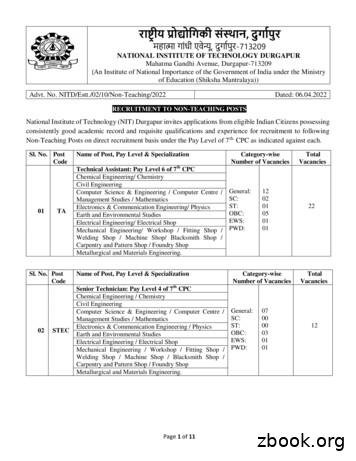Electrical Engineering Examination
Kuwait Society Of Engineers2018Electrical EngineeringExaminationElectrical EngineeringPage 1
Kuwait Society Of Engineers2018Coverage of the Electrical Engineering ExamThe Electrical Engineering Exam questions will cover the following areas:Number of Questions#Area1Fundamentals of Electrical Circuits8 or 9 questions2Fundamentals of Electromagnetism8 or 9 questions3Electrical machines and Power Systems8 or 9 questions4Electronics8 or 9 questions5Fundamentals of Communication8 or 9 questions6Control System Fundamentals8 or 9 questionsTotal50 questionsThe exam covers the six areas mentioned above (8 or 9 questions from each area).The topics covered in the Electrical Engineering Exams are listed below.Electrical EngineeringPage 2
Kuwait Society Of Engineers2018Fundamentals of Electrical Circuits:- Circuit variables and elements- Circuit laws and simple resistive circuits- Inductance and Capacitance- Responses of RL, RC and RLC Circuits- AC network analysis- Sinusoidal Steady-State Analysis- AC power Calculations- Power factor correctionFundamentals of Electromagnetism:- Electrostatic Fields in Material Space- Magneto static Fields- Inductance and Capacitance- Maxwell’s Equations and Electromagnetic Waves- Electromagnetic Wave PropagationElectrical machines and Power Systems:- Electro-mechanical energy conversion- Single and three-phase circuits- DC motors and generators- Transformers- AC machines- Synchronous machines- Induction motors- AC power and the per unit system- Transmission line models in the transient and the steady state,- Basics of Power system modelingElectrical EngineeringPage 3
Kuwait Society Of Engineers2018Electronics:- Operational amplifiers characteristics and configurations- Diodes characteristics and circuits- Field Effect Transistors (FET) and bipolar junction transistors (BJT) characteristics- Biasing- Large/small signal models- High and low frequency responses of amplifiers- Data conversion and oscillator circuits.- Basics of Digital logic circuitsFundamentals of Communication:- Convolution- Signal transmission and channel characterization- Fourier series and transform- AM modulation and demodulation- FM Modulation and demodulation- Behavior of analog communication systems in the presence of noise- Basics of digital communication systems.Control System Fundamentals:- Introduction to control systems- Transfer functions- Block diagrams- Time responses- Performance specifications of control systems- Stability and the Routh-Hurwitz criterion- Basic control actions and response of control systems- Root Locus and Bode plotsElectrical EngineeringPage 4
Kuwait Society Of Engineers2018Sample Questions of the Electrical Engineering ExamQ1. What is the equivalent impedance of the following circuit:A.10 j3 ΩB.10 – j3 ΩC.10 – j ΩD.10 j4 Ωw 200 rad/sQ2. Most of the loads in power systems are:A.Capacitive LoadsB.Inductive LoadsC.Resistive LoadsD.Zero power factor loadsQ3. For the circuit shown in the figure, the diode has an ON voltageof VD 0.7 Volt, thenA.V 0.7 Volt and I 1.72 mAB.V 5 Volt and I 0 AC.V 0 Volt and I 2 mAD.V -0.7 Volt and I -1.72 mAQ4. If an electromagnetic wave is incident on a perfect conductor, thenthe wave would beA.Totally absorbedB.Totally reflectedC.Totally transmittedD.Partially transmittedElectrical EngineeringPage 5
Kuwait Society Of Engineers2018Q5. The wave E(t) A sin (ωct m(t)) is underA.Amplitude modulationB.Frequency modulationC.No modulationD.All the aboveQ6. Consider the system depicted in the following block diagram. Thesignal r is the reference signal for the output y. The closed-looptransfer function of the system is:e ryA.5s ( s 4)B.5Ks ( s 4)C.5Ks 4s 5KD.None of the above2Electrical EngineeringPage 6
Kuwait Society Of Engineers2018Recommended References the Electrical Engineering ExamThe following references are suggested for the Electrical Engineering Exam.1.J. Nilsson and S. Riedel, “Electric Circuits” 9th edition, Addison Wesley, 2011.2.M. N. O. Sadiku, “Elements of Electromagnetics”, 6th edition, Oxford University Press, 20113.E. Fitzgerald, C. Kingsley and S. D Umans, “Electric Machinery”, 6th edition, Mc-Graw-HillHigher Education, 2002.4.S. Chapman, “Electric Machinery Fundamentals", 4th edition, McGraw-Hill, 2005.5.A. S. Sedra and K. C. Smith, “Microelectronic Circuits” 7th edition, Oxford University Press,2015.6.B. P. Lathi and Z. Ding, “Modern Digital and Analog Communication Systems”, 4th edition,Oxford University Press, 2009.7.N. S. Nise, “Control Systems Engineering”, 7th edition, John Wiley & Sons, 2015.Electrical EngineeringPage 7
The Electrical Engineering Exam questions will cover the following areas: The exam covers the six areas mentioned above (8 or 9 questions from each area). The topics covered in the Electrical Engineering Exams are listed below. Electrical Engineering Page 2 # Area Number of Questions 1 Fundamentals of Electrical Circuits 8 or 9 questions
Replacing: ND: Engineering: Electrical Diploma in Engineering Technology in Electrical Engineering (Extended), Replacing: ND: Engineering: Electrical (Extended) Diploma in Engineering Technology in Computer Engineering, Replacing: ND: Engineering: Computer Systems Bachelor of Engineering Technology in Electrical Engineering *New Qualification*
Electrical Infrastructure includes an electrical installation, electrical equipment, electrical line or associated equipment for an electrical line. 1.9 Electrical installation As per the Electrical Safety Act 2002 (s15) (a) An electrical installation is a group of items of electrical equipment that—
Materials Science and Engineering, Mechanical Engineering, Production Engineering, Chemical Engineering, Textile Engineering, Nuclear Engineering, Electrical Engineering, Civil Engineering, other related Engineering discipline Energy Resources Engineering (ERE) The students’ academic background should be: Mechanical Power Engineering, Energy .
(vi) Electrical Engineering/ Electrical Shop: First Class B.E/B.Tech/ Diploma in Electrical Engineering/ Electrical and Electronics Engineering or B.Sc/M.ScWith Electrical Sciences/ Electrical Engineering/ Physics/ Applied Physics as a subject. (vii) Mechanical Engineering/ Workshop/ Fitting Shop/ Welding Shop/ Machine Shop/ Blacksmith .
study programmes, i.e the Electronic Engineering Programme leading to the Bachelor of Engineering (Honours) (Electronic Engineering) and Electrical Engineering Programme leading to the Bachelor of Engineering (Honours) (Electrical Engineering). As of 2002/2003, another programme has been offered,
DIPLOMA IN ELECTRICAL & ELECTRONICS ENGINEERING State Board of Technical Education & Training Telangana State HYDERABAD. D:\Backup\SBTET_C14\DEEE - 1st Proof - 2 2 2 3 . 5 EE -105 Electrical Engineering Materials 66 6 EE -106 Basic Electrical Engineering 71 7 EE -107 Engineering Drawing 76 8 EE -108 Basic Electrical & Electronics
Electrical Engineering 8 4. Curriculum Review Basis B.Sc./BS/BE Degrees 15 5. Recommended list of Non-Engineering Domain Courses 16 6. Recommended list of Engineering Domain Courses in Electrical Engineering 17 7. Recommended list of Elective Courses in Electrical Engineering distributed according to variants 18 8.
Annual Women's Day Celebration Theme: Steadfast and Faithful Women 1993 Bethel African Methodi st Epi scopal Church Champaign, Illinois The Ministry Thi.! Rev. Sleven A. Jackson, Pastor The Rev. O.G. Monroe. Assoc, Minister The Rl. Rev. James Haskell Mayo l1 ishop, f7011rt h Episcop;l) District The Rev. Lewis E. Grady. Jr. Prc. i ding Elder . Cover design taken from: Book of Black Heroes .























